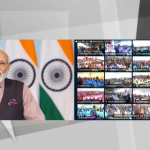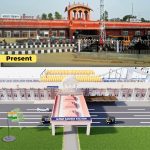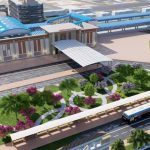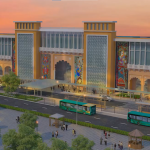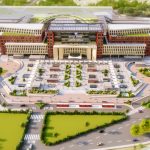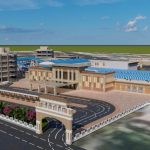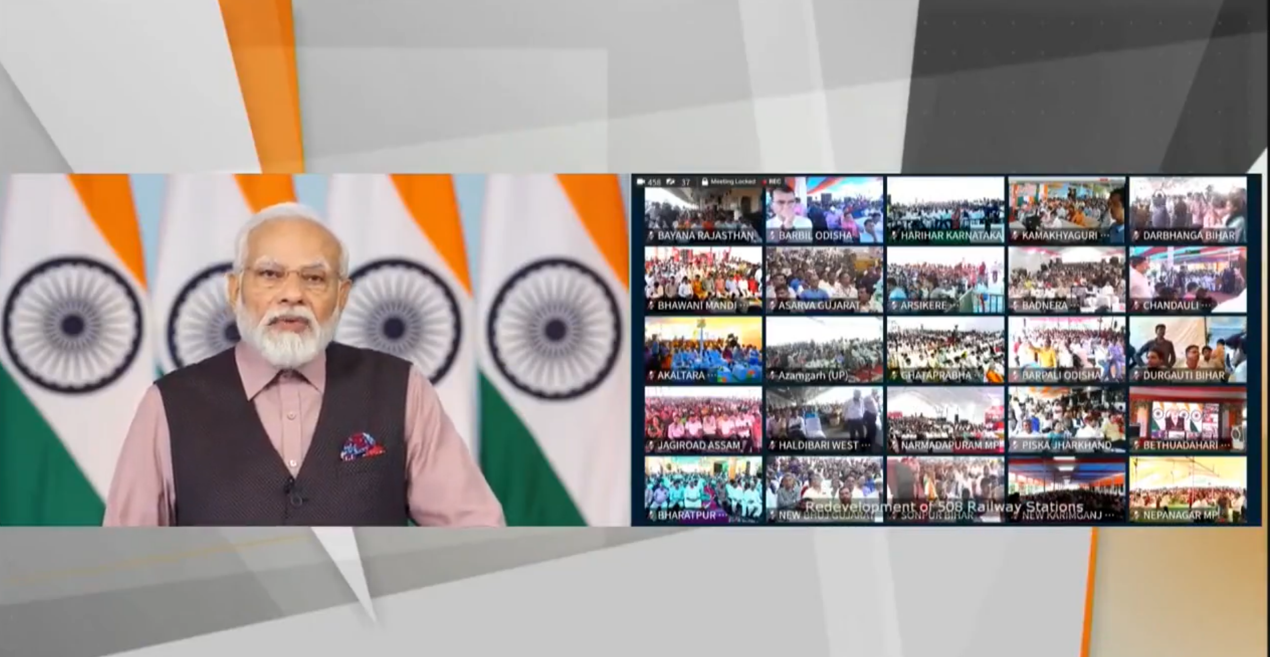 India is starting a rail station development programme called ‘Amrit Bharat Railway Stations’, launched by the Prime Minister Narendra Modi on August 6, 2023, via a video conference.
India is starting a rail station development programme called ‘Amrit Bharat Railway Stations’, launched by the Prime Minister Narendra Modi on August 6, 2023, via a video conference.
The entire project covers redevelopment works at 1,309 stations across the country with the first 508 train stations across 27 states and union territories* to need an investment of Rs 24,470 crores (USD 3 billion).
The ceremony to launch the modernisation works was attended by the Railway Minister, Ashwani Vaishnawji, members of the Union Cabinet from country’s regions, governors of various states, Chief Ministers, Ministers of State Cabinets, and other officials.
Master plans are being prepared for the development of these stations as ‘City Centres’, which will better integrate cities’ landscape and public transport system creating an urban approach centered around the railway station.
“The redevelopment project will be a huge campaign for infrastructure development in the country along with the railway infrastructure that will bring benefits to all states in the country,” the prime minister said.
The redevelopment will provide modern passenger amenities along with ensuring better traffic management, intermodal integration and signage particularly for passengers with reduced mobility. Works at the selected stations will include the modernisation of buildings, new platforms and better seating areas, upgraded waiting rooms and free Wi-Fi.
The programme aims at delivering more comfort and capacity for passengers as well as increasing tourism which will all boost the economic activities in the regions. The projects will be carried out on a ‘one station one product’ scheme that will help artisans and local companies to grow, while will keep each region’s tradition and brand. “The stations will present a glimpse of India’s cultural and local heritage and will be a symbol of the modern aspirations of the country along with its ancient heritage,” the Prime Minister emphasised.
During his speech, the Prime Minister underlined the importance of the rail infrastructure expansion. In the last decade, “the length of track laid in the country is more than the combined railway network in South Africa, Ukraine, Poland, the UK and Sweden. In the last year alone, India laid more railway tracks than the combined railway network of South Korea, New Zealand and Australia. Today, the government is working to make the rail journey accessible as well as pleasant. The effort is to provide the best possible experience from train to station,” Narendra Modi said.
Railway sector is essential for India’s transport system and its economy. This year, railways received a budget of more than Rs 2.5 lakh crores (about USD 30 billion), a five-fold increase as compared to 2014. In addition, locomotive production increased by 9 times in the last nine years and the manufacturing of HLB coaches increased by 13 times.
In the Northeast of the country, work is ongoing to double the single track lines, gauge conversion, electrification and construction of new railway lines, “commissioning of new railway lines in the region has increased three times”.
Since 2014, India has built 2,200 km of tracks of the freight corridor network reducing travel time. The cargoes reach western ports from Delhi NCR in 24 hours from previously 72 hours. 40% of time reduction is also recorded on other routes.
As India is on its decarbonisation path, national authorities plan to make railways more environment friendly to reduce carbon emissions relying on the electrification of the lines. “100 percent rail line electrification will be achieved very soon which will result in all the trains in India running only on electricity. The stations that generate electricity from solar panels has increased to more than 1200 in the last 9 years,” Modi explained.
The government aims to produce green energy at each railway station in the near future and to install LED lights at the stations as well as on 70,000 coaches to reduce consumption. Based on green electricity, the stations to be developed under the new programme will meet the standards of green buildings. By 2030, India railway sector would run on zero emissions.
This year, India has signed important contracts to modernise its railway sector. A USD 6.5 billion contract was awarded to Kinet Railway Solutions consortium for the design and supply of Vande Bharat electric trains with 16 cars each. The consortium was established by Transmashholding (TMH), Rail Vikas Nigam Limited (RVNL) and Locomotive Electronic Systems (LES) which will be also responsible for the maintenance of the new trains for 35 years.
At the beginning of 2023, Indian Railways and Siemens Mobility signed a contract for the supply of 1,200 locomotives, including full service maintenance for 35 years. Siemens will be also in charge for locomotive testing and deliveries are scheduled to take place over a period of 11 years. The 9,000 horsepower (HP) locomotives which will be locally produced at Siemens plants, will be capable of hauling loads of 4,500 tonnes running at a speed of 120 km/h.
In addition, the rolling stock of Indian Railways is constantly renewed as Wabtec delivered the 500th Evolution Series locomotive manufactured at manufacturer’s plant in Marhowra, Bihar.
Alstom has also delivered Indian Railways the 300th WAG12B electric locomotive, under the EUR 3.5 billion contract for the supply of 800 high-powered double-section locomotives. The vehicles are designed to have a maximum speed of 120 km/h hauling 6,000 tonnes.
*The rail station development programme includes 55 stations in Uttar Pradesh and Rajasthan, 49 in Bihar, 44 in Maharashtra, 37 in West Bengal, 34 in Madhya Pradesh, 32 in Assam, 25 in Odisha, 22 in Punjab, 21 each in Gujarat and Telangana, 20 in Jharkhand, 18 each in Andhra Pradesh and Tamil Nadu, 15 in Haryana, 13 in Karnataka among others.
Share on:



